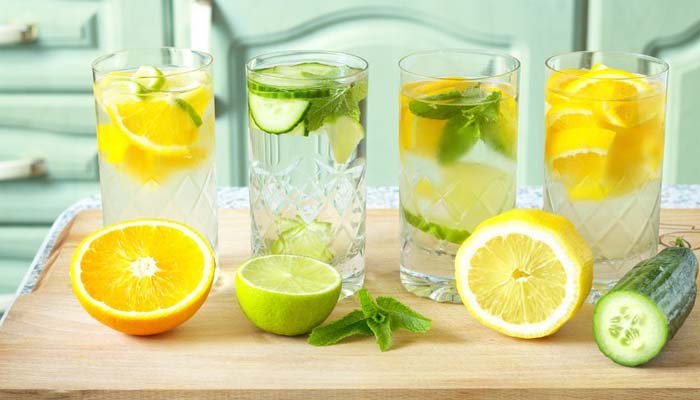
Water. We all know we should drink more of it. Not only is this beverage cheap, easily accessible, and calorie-free, but it could also be your #1 weight-loss tool!
Water is the second most consumed beverage in the US - second only to soda - which is a scary statistic since sugar consumption (as much as 11.5 teaspoons in one 12oz Mountain Dew!) increases your risk of obesity, stroke, heart disease and more. In fact, if you choose to opt for water in place of one soda each day you'll save 62,050 calories each year which could add up to 17.7 lbs of effortless weight loss! With those numbers its pretty hard to justify your soda fix!
Your body is made up of 60% water, and water plays several important functions in your body. It helps transport nutrients in the body, regulates body temperature, aids in food digestion, and more.
While you may understand that water is important, what you may not know is exactly HOW you should be drinking water to ramp up fat loss. Let's take a look at a few simple tricks you can start implementing today to get you closer to your goals:
If you've ever heard of drinking a glass of water before a meal, you might have been onto something: 500ml (16.9 oz) of water 30 minutes before a meal stimulates the digestive tract and begins stomach stretching.
- When your stomach stretches it causes the release of digestive enzymes. The amount of stretching is proportional to the amount of acid and enzymes released.
- This stretching signals to the body that there is food coming in = No need to store fat!
- The more enzymes and acid available, the better you'll be able to digest your food and assimilate nutrients from your food.
- Without adequate enzymes and acid, food is incompletely digested and failure of assimilation occurs. If you fail to assimilate the nutrients from your food it could lead to vitamin and mineral deficiencies.
- Stomach stretching may reduce the amount of food you eat.
So, cool! Drink more water, stretch your tummy, consume less calories and utilize your foods' nutrients better - Got it! But wait, there's more to it:
Does water temperature matter?
- Hot/Warm water helps digestion by stimulating digestive enzymes better than cold water.
- Cold water causes the body to have to heat the water, which is good for BETWEEN meals, but when you're approaching a meal it's best to stick with warm water.
- The reasoning behind this lies in the Vagus nerve which runs from your belly to your brain and controls your ability to make digestive enzymes. Cold water shuts down the Vagus nerve and delays your body's ability to make digestive enzymes.
- If you drink cold water with your meal (or at the end of your meal), then it takes a while for your body to heat that water up. Only when it does are digestive enzymes secreted. Delaying the secretion of these enzymes registers to your brain as hunger, so you may get hungrier sooner by drinking cold water with the exact same meal than if you drank hot or warm water.
Okaaaay... so drink warm water with your meals and cold water between meals. Any other tips?
- Digestive enzymes and acid production is halted by stress. Make mealtimes calm and relaxed.
- Stress stimulates the HPA Stress Axis which releases all the stress hormones like cortisol.
- When stress hormones like cortisol are present it makes it nearly impossible to lose weight.
- Around meals we want to avoid stress as much as possible - Meals should be a relaxing occasion, not fueled by emotional upset or stimulants, so as to allow adequate HCl secretion.
- Stick to decaf beverages surrounding meals to avoid the psychoactive effects of the caffeine and subsequent cortisol release.
Other tips to consider:
- Add lemon to your water to increase acid and enzyme production.
- Eat REAL SALT! A good quality sea salt (my favorite is Pink Himalayan Sea Salt) stimulates stomach acid production as well as provides a good dose of good-for-you minerals, like magnesium.
- Consider Zinc - Zinc is critical for the production of HCl. You can obtain a good dose of Zinc from eating whole foods like pumpkin seeds, grass-fed beef, pastured Lamb, chicken, clams and salmon.
- Chew your food. Mastication (chewing) stimulates digestive enzymes in the mouth and helps break foods into the smaller particles possible for better digestion.
Feeling thirsty yet? Grab a glass of the clear stuff and raise a toast to your health!
really good post. and nice ideas! do you drink tap water or do you have an reverse osmosis system?
Thanks @codylean ! This time of year it's mostly tap water, but when the weather is warmer we frequent local natural springs to fill gallon jugs and keep on hand. Do you use reverse osmosis?
Congratulations @fragileritzy! You received a personal award!
Happy Birthday! - You are on the Steem blockchain for 1 year!
Click here to view your Board
Congratulations @fragileritzy! You received a personal award!
You can view your badges on your Steem Board and compare to others on the Steem Ranking
Vote for @Steemitboard as a witness to get one more award and increased upvotes!